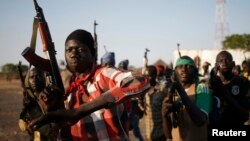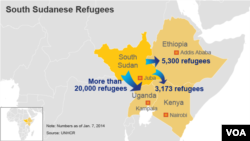ADDIS ABABA —
The second round of peace talks between South Sudanese rebels and the government is scheduled to open Tuesday in Ethiopia's capital. The rebels say that unless their demands are met, however, they will boycott the negotiations.
The East African regional bloc IGAD says this stage of talks will focus on a political process. But delegates for the rebels side are putting a hold on those plans. They said Monday they will not participate unless three demands are met: the withdrawal of government troops from a U.N. camp in Juba, the release of four political detainees the government has held since mid-December, and the withdrawal of Ugandan troops from South Sudan.
A spokesperson for the opposition, Yohanis Pouk, said they have no choice but to abstain. “We feel that they are not honoring all the agreements that we signed with them. And therefore we think that 'Let us first implement the agreement we signed, then we go to the second round.'”
New round
IGAD envoy and lead negotiator Seyoum Mesfin said the new round of talks will start regardless. “It does not reflect the preparations and the process that we are in. Because the launching of this second phase of the negotiations would be a reality and there is a commitment from all parties,” he said.
The two sides signed a pair of agreements in late January - one calling for a cessation of hostilities, the other dealing with the status of eleven political detainees. Since then, seven of the detainees have been released. Those seven have informed IGAD they will not take part in the talks, on either the side of the government or the rebels.
The presence of Ugandan troops fighting alongside South Sudanese government troops also has been an issue.
Ethiopian Prime Minister Hailemariam Desalegn, who also is chairman of IGAD, said IGAD supports Uganda for supporting a legitimate chosen government, though he also said the intervention of foreign troops can be worrisome.
“What worries IGAD so much is because of this intervention, the conflict might end up into regional conflict, because there are other interests also from other sides. And if everybody looks into specific countries national interest alone, then that will destabilize the whole regional because it becomes a regional conflict,” he said.
Fighting broke out in South Sudan in mid-December and has resulted in a bloody conflict that has left thousands dead and has displaced more than a half-million people.
The talks Tuesday are to begin by setting the agenda for the political process - if the talks begin at all.
The East African regional bloc IGAD says this stage of talks will focus on a political process. But delegates for the rebels side are putting a hold on those plans. They said Monday they will not participate unless three demands are met: the withdrawal of government troops from a U.N. camp in Juba, the release of four political detainees the government has held since mid-December, and the withdrawal of Ugandan troops from South Sudan.
A spokesperson for the opposition, Yohanis Pouk, said they have no choice but to abstain. “We feel that they are not honoring all the agreements that we signed with them. And therefore we think that 'Let us first implement the agreement we signed, then we go to the second round.'”
New round
IGAD envoy and lead negotiator Seyoum Mesfin said the new round of talks will start regardless. “It does not reflect the preparations and the process that we are in. Because the launching of this second phase of the negotiations would be a reality and there is a commitment from all parties,” he said.
The two sides signed a pair of agreements in late January - one calling for a cessation of hostilities, the other dealing with the status of eleven political detainees. Since then, seven of the detainees have been released. Those seven have informed IGAD they will not take part in the talks, on either the side of the government or the rebels.
The presence of Ugandan troops fighting alongside South Sudanese government troops also has been an issue.
Ethiopian Prime Minister Hailemariam Desalegn, who also is chairman of IGAD, said IGAD supports Uganda for supporting a legitimate chosen government, though he also said the intervention of foreign troops can be worrisome.
“What worries IGAD so much is because of this intervention, the conflict might end up into regional conflict, because there are other interests also from other sides. And if everybody looks into specific countries national interest alone, then that will destabilize the whole regional because it becomes a regional conflict,” he said.
Fighting broke out in South Sudan in mid-December and has resulted in a bloody conflict that has left thousands dead and has displaced more than a half-million people.
The talks Tuesday are to begin by setting the agenda for the political process - if the talks begin at all.







